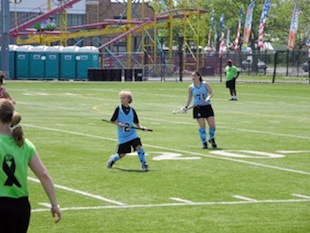A group of officials in New York have taken the drastic step of banning a 13-year-old boy from playing for his high school's all girls field hockey team for a simple if ludicrous reason: He's simply too good.
As reported by New York CBS affiliate 1010 WINS, Fox News and a variety of other outlets, 13-year-old Southampton (N.Y.) High student Keeling Pilaro will not be allowed to compete for the Southampton field hockey team in fall 2012 because he has simply been too dominant a player over the past two seasons. Pilaro began competing for the Southampton varsity field hockey team at just 11 years of age, and at age 13 still stands a tiny 4-foot-8 and 82 pounds.
What Pilaro lacks in dominant physical stature he makes up for in internal experience. The teen was raised in Ireland until his family came to Long Island, and grew up playing field hockey in Europe, where the sport is relatively popular among boys just as it is in the U.S. among girls.
In 2011, Pilaro was the only boy to compete in the sport in Suffolk County, New York, and he emerged as Southampton's leading scorer with 11 goals. To try and stem that influence -- and the possible influx of other male athletes in the sport -- New York's Section 11 (which includes Suffolk County) decided that Pilaro had too significant an advantage when compared to other field hockey players, ostensibly just because he is of a different gender.
"As a sport, it's a girls sport," Section 11 executive director Ed Cinelli told MyFoxNY.com. "When a boy plays, it leads the way for other male players to come in and take over.
"[Pilaro is] having a significant adverse effect on some of his opposing female players. The rules state he would be allowed to play if he wasn't the dominant player."
Clearly, there are no physical justifications for banning Pilaro, as his mother made clear.
"He is not a physical dominating presence on the field by any stretch," Fairley Pilaro told 1010 WINS. "In fact, he's far below the girl's varsity height and weight."

Pilaro's father has already unsuccessfully appealed the decision once, and the family has a second appeal of the decision scheduled to be heard in May.
While Section 11's decision to ban Pilaro may be an attempt to protect competitive equity among its field hockey programs, it is likely to open up an enormous can of worms by doing so. Even Dana Edell, the executive director of the SPARK movement, a activist organization for the equality of girls in sports, raised concerns about what banning Pilaro would do to the enforceability of Title IX regulations and the equality of opportunity between the sexes.
"If he's not allowed to try out for the team, that opens up the door for all kinds of discrimination," Edell told MyFoxNY. "It's the coaches responsibility to make sure the players are safe. And a boy should not be penalized because he's good."
The issues raised when boys compete in traditionally all-girls sports are not new ones, with competitive equity and physicality often raised as concerns. Still, with lack of better outlets for their specific skills, there are often no real solutions to the issues raised by the likes of field hockey and swimming coaches in states such as Massachusetts. In May 2011, Massachusetts field hockey coaches attempted to institute guidelines which would limit the areas and amount of time boys were allowed to be on the field during a game, but the rule changes were eventually rejected by the Massachusetts Interscholastic Athletic Association's Board of Directors over fears it would violate Title IX.
Now, if Pilaro is successfully kept out of varsity competition in 2012, other states and governing organizations may seriously investigate opportunities to fundamentally limit male players' participation in female sports, regardless of whether that is fair, just as it would be considered unfair to bar a female football player interested in competing for her school's team as a place kicker, lineman or even a running back if she so chose.
"This is an issue of safety, equity, and liability," Reading (Mass.) High field hockey coach Mim Jarema told an MIAA meeting at which the Massachusetts rule changes were discussed. "It's time for us to take up this challenge."
Now those steps are being boldly taken two states to the south, even though it seems laughable to consider the player who has brought it on as a safety risk to the competitors around him.
Want more on the best stories in high school sports? Visit RivalsHigh or connect with Prep Rally on Facebook and follow us on Twitter.